
Vasectomy
Overview
A vasectomy is a safe, effective, and permanent method of male contraception. It is a minor surgical procedure that prevents sperm from reaching the semen, ensuring that pregnancy does not occur. Vasectomy is a popular choice for men seeking a long-term birth control solution, as it offers a nearly 100% success rate with minimal risk and recovery time.
The vasectomy procedure is typically performed under local anesthesia and takes about 15-30 minutes. It involves cutting or sealing the vas deferens, the tubes that carry sperm from the testicles to the urethra. There are two common techniques:
- Conventional Vasectomy: Involves small incisions in the scrotum to access the vas deferens.
- No-Scalpel Vasectomy: A less invasive method that uses a small puncture, reducing discomfort and speeding up recovery.
After the procedure, sperm is no longer present in the semen, making pregnancy highly unlikely. However, alternative contraception is recommended for a few months until a semen analysis confirms the absence of sperm.
Benefits of Vasectomy
- Highly Effective: More than 99% success rate in preventing pregnancy.
- Quick Recovery: Most men resume normal activities within a few days.
- Minimal Side Effects: Low risk of complications or long-term health issues.
- Cost-Effective: A one-time procedure eliminates the need for other forms of birth control.
- No Impact on Sexual Function: Libido, erections, and ejaculation remain unchanged.
Post-Procedure Care
- Rest for 24-48 hours and avoid strenuous activities for a few days.
- Use ice packs to reduce swelling and discomfort.
- Wear supportive underwear for added comfort.
- Avoid sexual activity for about a week or as advised by your doctor.
- Follow up with a semen analysis to confirm the success of the procedure.
Conclusion
Vasectomy is a safe, effective, and permanent solution for men who are certain they do not want more children. It is a simple outpatient procedure with minimal recovery time, offering a worry-free approach to contraception. If you’re considering a vasectomy, consult with a qualified specialist to discuss your options and ensure it’s the right choice for you.
FAQs
1. Is a vasectomy reversible?
Vasectomy reversal is possible but not always successful. The procedure is more complex, costly, and does not guarantee fertility restoration. Therefore, a vasectomy should be considered a permanent decision.
2. How soon does a vasectomy become effective?
A vasectomy does not work immediately. Sperm may still be present in semen for a few months after the procedure. A follow-up semen analysis, typically 8-12 weeks post-procedure, is required to confirm sterility before stopping other contraception methods.
3. Will a vasectomy affect my testosterone levels or sexual performance?
No, a vasectomy does not impact testosterone levels, libido, erections, or ejaculation. It only prevents sperm from mixing with semen, so sexual function remains unchanged.